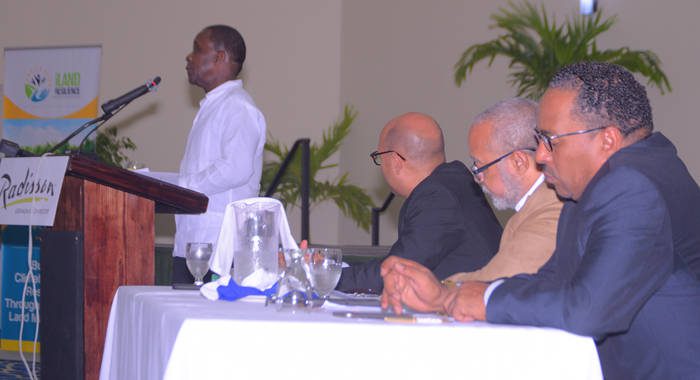Environment ministers and technical officers from the Organisation of Eastern Caribbean States (OECS) as well as key regional partners from international agencies attended the fourth OECS Council of Ministers meeting recently held in Grenada.
The theme for the event was “Accelerating Sustainable Development: Addressing Challenges, Creating Opportunities”.
The council, which is responsible for guiding the OECS Commission and making recommendations to the OECS Authority on issues relating to the environmental sustainability, staged the meeting that offered an opportunity for its member states to strengthen regional partnerships in related matters and also support members in increasing sustainability and minimising vulnerability.
Protecting the region’s natural resources for the social and economic benefits of the people was also a main factor discussed at the meeting.
Other key areas of interest included: water resource management, ocean governance, energy, climate change and other relevant issues related to environmental sustainability and natural disasters in Small Island Developing States (SIDS).
The meeting also saw the official launch of the European Union funded ILAND RESILIENCE initiative, which is the local OECS brand, covering the OECS managed Global Climate Change Alliance (GCCA) project which focuses on sustainable development in Small Island Developing States through sustainable land management towards climate change adaption.
Head of the OECS GCCA Project, Chamberlain Emmanuel, highlighted that through the ILAND RESILIENCE Initiative, the OECS Commission and its member states can demonstrate a capacity to deal with the threats and opportunities that come with climate change.
“The project which started in 2014 has strategically identified the needs of the member states and identified suitable interventions to address the problems faced. Several projects have been undertaken throughout member states to address keys challenges faced due to the effects of climate change. Examples of these projects include coastal protection initiatives in the British Virgin Islands and in Nevis, water security through rainwater harvesting in Grenada and Montserrat,” Chamberlain added.
Prime minister of host country Grenada, Keith Mitchell, while addressing the gathering at the opening ceremony of the event said “small islands are too vulnerable to be careless in issues that affect their resistance to natural and other disasters”.
He then reiterated that by working collectively, small islands states can lead in the area of sustainability.
Also incorporated into the meeting was a climate change exhibition hosted by the Ministry of Education, Human Resources and the Environment of Grenada. The exhibition was used as a means of informing the regional delegation as well as the Grenadian public and wider region about measures taken in the islands in relation to climate change resilience.
The exhibition covered a wide range of areas including: water management, energy, coastlines and the ocean, education and awareness, food security, and alternative livelihood.
On their last day on the island, the delegation also took a tour of the Coral Gardening Project, located in the Grand Anse Bay, a project that was implemented by UN Environment in collaboration with the Government of Grenada. This project rebuilds the damaged reef by replanting coral.
The Green Climate Fund Structured Dialogue was another key component of the conference. This dialogue is meant to support Caribbean countries in more easily accessing the Green Climate Fund directly.






